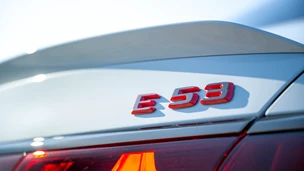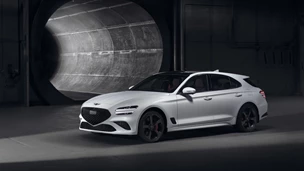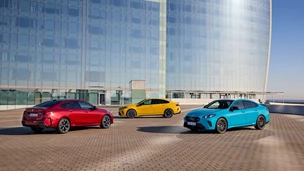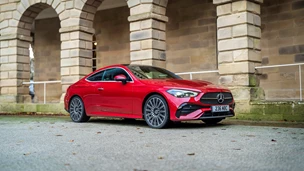Despite its coupe-style looks (elegant enough but not easily distinguishable from many other Audis of about the same size), the A7 is essentially the hatchback version of the A6, not as practical as the Avant estate but significantly more so than the saloon. Immediate rivals are hard to find: BMW's 6-Series Gran Coupe doesn't trail the Audi by much in terms of luggage space, but it has a bootlid rather than a full-sized tailgate.
Not including the high-performance S7 and RS7 variants, all A7s have turbocharged six-cylinder 3.0-litre engines. Power outputs for the diesels range between 215bhp and 316bhp, and there's a 320bhp petrol unit too.
An automatic transmission of one sort or another is standard on all of them, while most also have quattro four-wheel drive fitted. The exception is the diesel ultra, which is front-wheel drive only in the interests of improving fuel economy and lowering CO2 emissions.
Performance
Although it doesn't have the most powerful engine, the 316bhp twin turbo 3.0 BiTDI diesel is the quickest A7, with a 0-62mph time of 5.2 seconds, one tenth less than that of the petrol-fuelled 3.0 TFSI. Even the 218bhp quattro diesels can do this run in 6.8 seconds, though the front-wheel drive ultra with that engine is half a second slower thanks to its slightly inferior traction during a full-tilt standing start.
Nearly all A7s have their top speed electronically limited to 155mph. The 218bhp cars don't need this because they can't get over 149mph, not that this is going to be an issue on UK roads.
Even if the BiTDI didn't give the best straightline performance, it would probably be our favourite. It's able to produce nearly 130bhp from as low an engine speed as 1400rpm, so you can make it accelerate hard immediately almost no matter what it's doing when you press the accelerator, and it sounds terrific. It may have only six cylinders, but Audi has tuned the exhaust to give a burble that could easily convince you there's a V8 under the bonnet.
Ride and Handling
All the major controls, particularly the steering, are well weighted and can be operated very smoothly
Broadly speaking, the A7 is set up to be comfortable rather than exciting. It never feels like a car you can hustle, even if you use the drive select system to sharpen up the suspension, and while the optional Sports differential may be a good conversation piece, spending more than £1,000 to get it seems otherwise pointless, since you're almost certainly not going to want to tackle corners with such gusto that you actually need it. Like other Audis, this one suffers badly if it's fitted with large wheels (19-inch or more) and low-profile tyres. The ride quality deteriorates noticeably when you do this, and it's worth considering only if you value looks over the driving experience. A small exception is that the BiTDI seems better able to deal with bigger wheels than the other cars in the range. All the major controls, particularly the steering, are well weighted and can be operated very smoothly.
Interior and Equipment
'Sportback' is normally Audi's name for a car with more luggage space than others in the range, but there is no such thing as a non-Sportback A7.
With the rear seats in place, the A7's luggage volume is 540 litres, matching that of the Mercedes E-Class and Jaguar XF saloons. Fold down those seats and the very large tailgate gives you access to 1,390 litres. If you want more than that in a premium car of comparable size, you're going to have to buy an estate. There's plenty of room for four large adults, too, though the driver has to accept Audi's bizarre decision to place the footrest a couple of inches too far away. If you position the seat far enough forward to be able to reach it comfortably, you're too close to everything else. Other than the fashionably poor rear visibility, the A7 is otherwise a pleasant car to sit in, and even in its simplest form it has a decent amount of equipment. However, typical Audi (and, in fairness, typical German) strategy means you have to pay a lot of money for a full set of toys. Exceeding the list price by £10,000 is easy, and doing so by double that not difficult.
Cost
Running costs are generally quite reasonable, especially if you go for one of the ultra diesels
Even without optional extras, nearly every A7 costs more than £50,000. In this context, its running costs are generally quite reasonable, especially if you go for one of the ultra diesels. These have CO2 emissions of 122g/km, which means modest annual Vehicle Excise Duty payments of £110. It's a pity Audi couldn't have reduced the figure by another 2g/km to bring the tax down to £30, but that's probably not going to turn anyone against it. The Benefit In Kind rate for 2015-16 is 22 per cent, and will drop to 21 per cent in the next financial year before rising again after that. Official combined fuel economy is the best in the range at 60.1mpg. The worst diesel figures are 52.3mpg and 162g/km for the BiTDI, and then there's a jump to 37.2mpg and 176g/km for the petrol TFSI. This is more than £3,000 cheaper than the BiTDI, but we'd expect the diesel to nullify that advantage at resale time.
Our Verdict
We quite like the A7, and if you want something that looks like a premium coupe (even though that's not quite what it is) with plenty of room for passengers and luggage your choice pretty much starts and ends here. The fact that it isn't really sporty doesn't matter, but we'd welcome better visibility and a rethink on the positioning of the foot rest, which surely can't be difficult to arrange. It's also slightly irritating that you could spend well over £70,000 when no car in the range has a list price of as much as £60,000, but this has been Audi policy for a long time now and we have to assume that it works.




